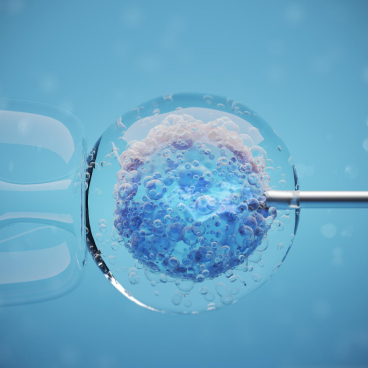
Female Infertility
1 in 5 married females during their reproductive years are unable to become pregnant, and GoFertility is here to help you attain your goal of having a baby.
According to the CDC, 1 in 5 married women 15 to 49 years old with no prior births in the U.S. aren’t able to get pregnant after one year of trying. Infertility is common both domestically and globally so couples can take solace knowing they aren’t alone in their infertility journey. Recently developed cutting-edge technologies and procedures are only aiding couples in attaining parenthood. There is hope, and GoFertility is ready to partner with you in your journey to fulfilling your dream of having a baby.
GoFertility, also known as CRMRS, is a St. Louis-based fertility clinic that ranked as one of the nation’s 50 best in 2023 according to Newsweek. We have helped hundreds of previously infertile couples have a baby since our opening in 2011, and you can read some of their success stories here. Every year since then, GoFertility has had a higher rate of pregnancy per embryo transfer than the national average.
Renowned infertility specialist, reproductive endocrinologist and embryologist Dr. Saji Jacob is GoFertility’s program, medical and laboratory director. He is one of a select few dual board-certified OB/GYN doctors and high-complexity clinical lab directors in the United States. Along with his highly trained team, Dr. Jacob provides the following infertility services for women:
- In-vitro fertilization paired with ICSI
- Ovulation induction
- Artificial insemination, specifically intrauterine insemination (IUI)
What is IVF-ICSI and How Does it Work?
Probably the most well-known and most popular choice for infertility as it has recently become the industry standard, IVF-ICSI aids patients who have endometriosis, fibroids, tubal disease or ovulation disorders. During IVF eggs are collected from the female’s ovaries at peak maturation. A single, healthy sperm is selected from the male partner for use in the ICSI fertilization process.

Once retrieved, mature eggs are injected with single sperms and placed into incubators to allow for fertilization. They are then moved into the cryo tank for freezing for use in a future cycle when the embryo gets placed into the female’s uterus. By allowing the female’s body to have a rest period before beginning the frozen embryo transfer cycle, success rates have improved dramatically. During the frozen embryo transfer cycle, our team can concentrate on building the uterus’s lining independently of stimulating the ovaries.
A full IVF cycle typically takes two to three weeks. The female patient will be administered hormones to grow all the follicles — fluid-filled sacs inside the ovaries that usually contain one egg — produced and aid with the timing of retrieval. GoFertility specializes in IVF-ICSI. With our detail-driven approach and skill in egg and sperm retrieval, we have successfully assisted hundreds of couples in attaining parenthood via IVF cycles.
What is Ovulation Induction?
In ovulation induction, hormonal therapies are prescribed to promote the development and release of female eggs. These medications stimulate the release of hormones that increase egg production. The treatments can induce multiple eggs to mature and improve the quality of these eggs, which boosts the likelihood of fertilization. Sometimes ovulation induction is paired with intrauterine insemination (IUI), which you can read more about below.

There are two types of ovulation induction medicines — oral and injections — with oral the first option for non-ovulating or infrequently ovulating females. Clomid or Letrazole are the most commonly recommended drugs, which block the effects of estrogen in the body. This triggers higher production of the follicle-stimulating hormone to produce additional follicles, which then aid in ovulation occurring.
If oral medications are unsuccessful, injectable medications are typically utilized. Both ultrasounds and blood work help our team track your progress and response to the medicine. The Center for Reproductive Medicine and Robotic Surgery puts patient health and well-being at the forefront of all our medical decisions. We will consult with you so you’re comfortable with the course of treatment and take time to answer any of your questions.
What is Artificial Insemination?
Artificial insemination is when doctors insert sperm directly into a female’s uterus, cervix or fallopian tubes. In doing so, this eliminates any obstructions and shortens the trip for the sperm to reach the oocytes. The most common method of artificial insemination is intrauterine insemination (IUI), where the sperm is placed in the uterus.

IUI is an effective treatment solution for females with normal fallopian tubes. When the mucus around the cervix is blocking sperm from entering the uterus, IUI bypasses this mucus to allow for direct entry. In male infertility, a low sperm counts or weakened sperm unable to reach the fallopian tubes can be solved by IUI.
If you have questions about any of these services or would like to learn more, please get in touch with our caring and knowledgeable team at 314-473-1285 or email AGraham@GoFertility.com. We have assisted hundreds of couples in their infertility journey with proven results and look forward to the opportunity to help you and your partner. We are always accepting new patients and typically book an in-office appointment within a week of you contacting us.